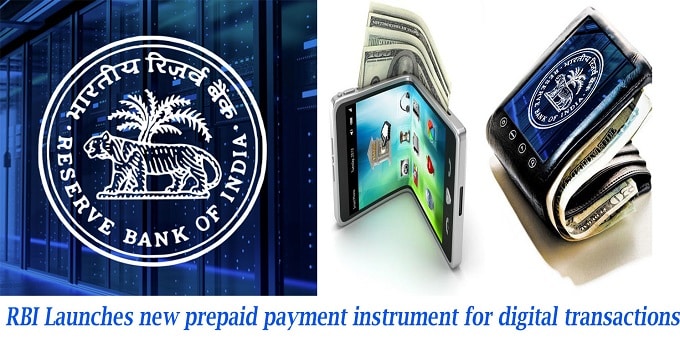On December 24, 2019, In order to boost small value digital transactions, the apex bank Reserve Bank of India (RBI), has launched semi-closed prepaid payment instrument (PPI) for transaction of goods and services up to a limit of Rs 10,000. This direction has made under Section 18 read with Section 10(2) of Payment and Settlement Systems Act, 2007. These PPIs will enhance the digitization of daily payments at local shops and retail outlets for the purchase of daily household goods and services. Key Features:
Key Features:
i.These will be issued by bank and non-bank PPI issuers after obtaining minimum details of the PPI holder which includes a mobile number verified with one time pin (OTP) and a self-declaration of name and unique identity/identification.
ii.The amount loaded in such PPIs shall not exceed Rs 10,000 per month and the total amount loaded during the financial year shall not exceed Rs 1,20,000. The amount outstanding at any point of time in such PPIs should not exceed Rs 10,000.
iii.There is an option for the closure of PPI at any time and also allow to transfer the funds back to source (payment source from where the PPI was loaded) at the time of closure.
What is PPI?
PPIs are instruments that facilitate purchase of goods and services, including financial services, remittance facilities, etc., against the value stored on such instruments.
i.Types of PPI– There are currently three kinds of PPIs allowed by RBI: closed system, semi-closed and open PPIs.
ii.Who can issue PPI– A company incorporated in India and registered under the Companies Act, 1956 / Companies Act, 2013 can issue and operate PPIs after receiving authorisation from RBI.
iii.In which form PPI is issued– The PPIs may be issued as cards, wallets, and any such form / instrument which can be used to access the PPI and to use the amount therein. PPIs in the form of paper vouchers shall no longer be issued.
About RBI
Establishment- 1935
Headquarters- Mumbai
Governor- Shaktikanta Das
Deputy Governor- 4 (M. K. Jain, B.P. Kanungo, N. S. Vishwanathan, one is yet to be appointed)





